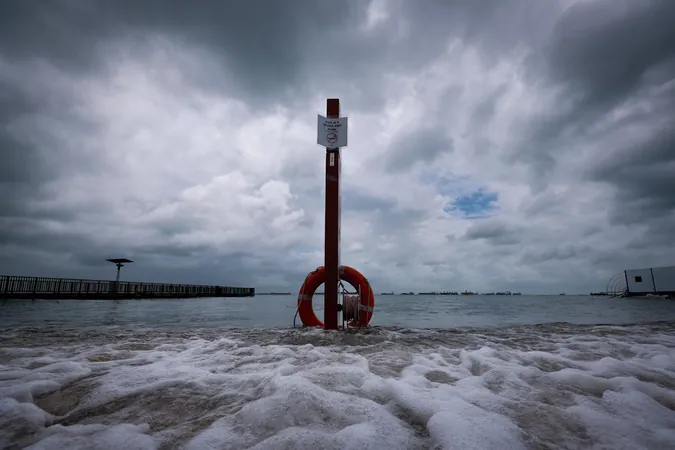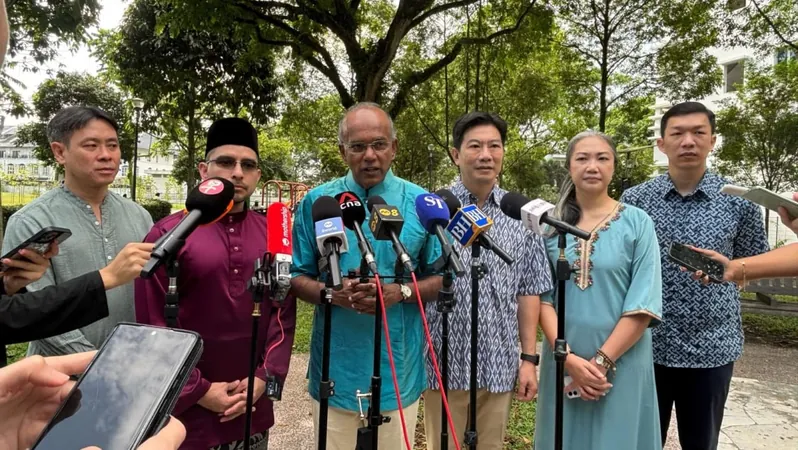
Brace Yourselves: Less Intense Monsoon Surge Hits Singapore Jan 17-19!
2025-01-17
Author: Siti
SINGAPORE – The Republic is gearing up for a second monsoon surge from January 17 to 19, but fear not—this one is expected to be shorter and less intense compared to the previous downpour that lasted four days.
The Meteorological Service Singapore (MSS), part of the National Environment Agency (NEA), stated that while the upcoming rain is anticipated, predicting its exact strength and impact is challenging due to various factors including wind patterns and cloud formations.
In a fortnightly weather update released on January 16, officials warned residents of the impending surge, noting that it would bring cooler and windier conditions alongside occasional heavy thunderstorms.
Residents along coastal areas are advised to be cautious, as higher tides could lead to flash flooding, particularly in low-lying zones like East Coast Park (ECP).
During a recent visit to ECP, the highest tide recorded was a staggering 3.2 meters.
Though light rain fell briefly, the drainage system held firm, preventing water from spilling over onto walkways.
While some visitors like Ms. Ida, a 34-year-old administrative worker, expressed confidence in Singapore's drainage capabilities, others like retiree Mr. Wee were unfazed, assuring that a little rain would not disrupt their plans.
Residents in areas like Mountbatten are more wary, having experienced significant flooding during the last surge.
Local homeowner Mrs. Phan shared her concerns about the recurring floods, which have prompted her to construct a slope outside her house to divert incoming water.
Meanwhile, newcomer Mrs. S.Y. Chen remains apprehensive, hoping that their yard drain will suffice to handle the excess runoff.
Singapore is currently in the throes of the northeast monsoon season that lasts from December to January, characterized by bursts of cold air from Central Asia.
These surges often lead to widespread rainfall and cooler weather in the tropics as the warmer air picks up moisture over the South China Sea.
With an impressive average rainfall of 376.8mm already recorded by mid-January—69.5% higher than the typical average—locals are on alert.
Experts suggest that 2025 could be one of the wettest January months on record, compounded by climate change factors that predict an increase in the intensity and frequency of rainfall.
According to Singapore’s third national climate change study released in 2023, climate change will likely exacerbate weather patterns, leading to more extreme rainfall and rising sea levels.
This escalation could mean even greater risks of coastal flooding when coupled with high tide events.
As Singapore prepares for the approaching surge, residents are advised to stay updated on weather forecasts and remain vigilant, especially in known flood-prone areas.
The question remains: how will this tumultuous weather impact daily life and infrastructure in the city-state? Stay tuned as we keep you posted on this evolving story!


 Brasil (PT)
Brasil (PT)
 Canada (EN)
Canada (EN)
 Chile (ES)
Chile (ES)
 Česko (CS)
Česko (CS)
 대한민국 (KO)
대한민국 (KO)
 España (ES)
España (ES)
 France (FR)
France (FR)
 Hong Kong (EN)
Hong Kong (EN)
 Italia (IT)
Italia (IT)
 日本 (JA)
日本 (JA)
 Magyarország (HU)
Magyarország (HU)
 Norge (NO)
Norge (NO)
 Polska (PL)
Polska (PL)
 Schweiz (DE)
Schweiz (DE)
 Singapore (EN)
Singapore (EN)
 Sverige (SV)
Sverige (SV)
 Suomi (FI)
Suomi (FI)
 Türkiye (TR)
Türkiye (TR)
 الإمارات العربية المتحدة (AR)
الإمارات العربية المتحدة (AR)